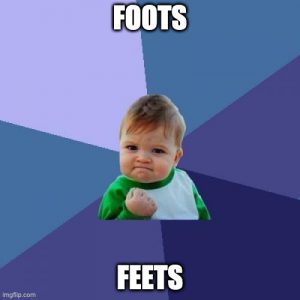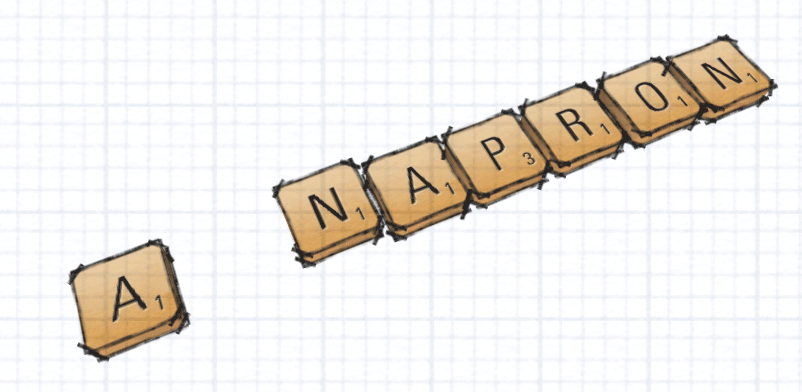The linguistic archaeology of feet
There’s been excitement recently about evidence that humans had set foot in the Americas as much as 22,500 years ago, pushing back the previous best estimate by almost ten thousand years. And by ‘set foot’, I mean literally. The tell-tale new evidence comes to us in the form of imprints left by human feet in a particularly well-preserved mudflat in New Mexico. So far, the humans themselves have not been uncovered by archaeologists, but their characteristic mark upon the mud has endured.
When linguists peer into the past, we also will occasionally use the imprints, left by something which has otherwise been lost, to infer its presence long ago — all of which brings us to the topic of feet, and not the kind that you’d use to walk across a mudflat, but the literal English word ‘feet’, which itself contains a wonderful imprint of a long-lost vowel.
Our story begins with the fact that in English, the word ‘feet’ is a little odd. It’s a plural that doesn’t end in ‘s’. As any child will tell you, you can’t get away with saying ‘foots’ for the plural of ‘foot’ for very long before someone bigger than you corrects it to ‘feet’. However, given that most English nouns do use an ‘s’ plural, it’s entirely sensible to ask why ‘feet’ is different. (Of course, ‘feet’ isn’t absolutely unique: English contains a select club of other, similar plurals like ‘geese’ and ‘teeth’, to which we’ll return in a minute.)

The tale of ‘feet’ begins around two millennia ago, when it was in fact a regular plural word. In proto-Germanic, the singular form would have been ‘fōt-s’ (pronounced approximately as fohts, where ‘ō’ is a long ‘o’ sound) and its corresponding plural ‘fōt-iz’, constructed with a simple plural suffix ‘-iz’. Over the following centuries, the sounds at the end of the plural form were worn away and eventually lost, as often happens during language change. However, before the suffix disappeared entirely, the ‘i’ vowel in it left its imprint on the ‘ō’ vowel, changing it to ‘ȫ’, which is to say ‘fōtiz’ became ‘fōti’ then ‘fȫti’ then ‘fȫt’ which by Old English had become ‘fēt’ and is now ‘feet’. In the meantime, the singular form ‘fōts’, which contained no ‘i’ vowel, changed very little indeed: it lost its suffix ‘-s’, becoming ‘fōt’ and then modern English ‘foot’. A similar story lies behind the plurals ‘geese’ and ‘teeth’: an original suffixal vowel ‘i’ changed ‘ō’ into ‘ȫ’, before disappearing, then ‘ȫ’ became ‘ē’.
You might say that the ‘i’ vowel left its imprint upon original ‘ō’ in the form of the altered vowel ‘ȫ’. One tool which linguistic archaeologists put to good use, is our knowledge of the characteristic imprints that one sound can leave upon another. In the case of the long-lost ‘i’ vowel, the imprint even has a name, umlaut. Historical umlaut is also what lies behind plurals like ‘mice’ and ‘men’.
Armed with the background knowledge that lost ‘i’ vowels changed ‘ō’ into ‘ȫ’, and in doing so gave rise to modern English alternations between ‘oo’ and ‘ee’, we can now go fossicking through the vocabulary for more lost ‘i’ vowels. Another suffix that was lost over the centuries was a causative suffix, which related nouns to verbs, such as ‘blood’ to ‘bleed’, or ‘food’ to ‘feed’: as you’ll have guessed, the verbs once contained a now-lost ‘i’. In some cases, pairs of sibling words such as these have grown apart over time. For instance, if you were to decide someone’s fate (or their ‘doom’) then you’d be judging them (or ‘deeming’ them), though as you can see, I had to produce a fairly contrived context to highlight the relatedness of ‘doom’ and ‘deem’.
Umlaut caused by a now-lost ‘i’ also crops up in several nouns ending in ‘-th’: compare not only ‘strong’ with ‘strength’, ‘long’ with ‘length’, or ‘broad’ with ‘breadth’, but also ‘hale’ with ‘health’ and ‘foul’ with ‘filth’.

Over decades of meticulous work, linguists have uncovered much about how languages around the world change over time, though much more still remains to be accounted for. One of the many lingering questions is what the conditions are, which favour the continued survival of idiosyncratic word forms like ‘feet’, long after they have lost their regularity. We know that many irregular words, such as the Old English plural ‘bēc’ for ‘books’ (corresponding to singular ‘bōc’), get removed over time, yet others persist for millennia. It’s an ongoing task for linguists to understand why some footprints remain while others get washed away.
